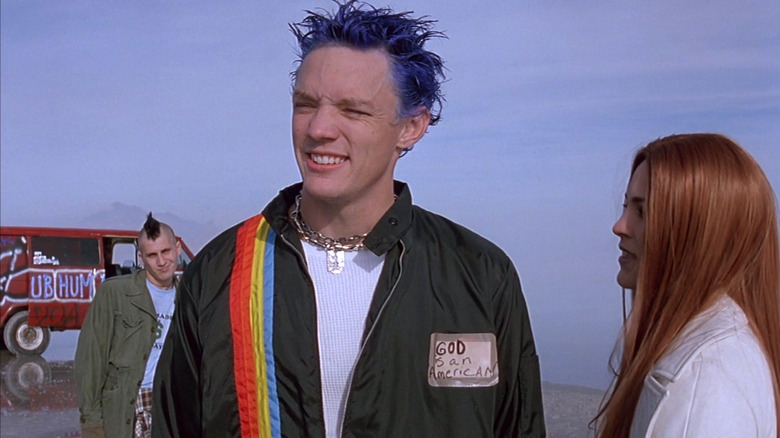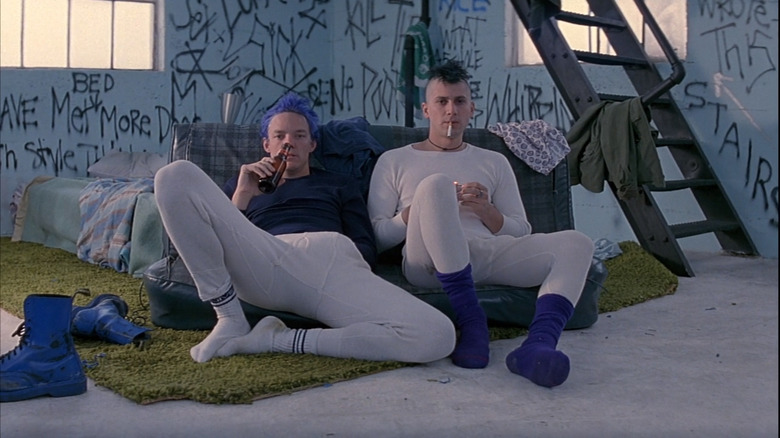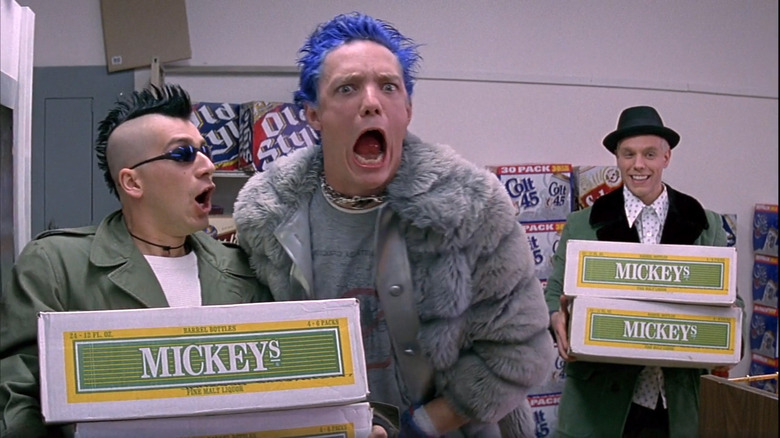The Daily Stream: SLC Punk Shows That It's Possible To Grow Up Without Selling Out
The Movie: "SLC Punk"
Where you can stream it: HBO Max
The pitch: Growing up is hard to do, but it's hellish when you're a punk kid trapped in a puritanical place like Salt Lake City, Utah. "SLC Punk" is a coming-of-age story about Stevo (Matthew Lillard), a twenty-something punk living with his best friend Heroin Bob (Michael Goorjian) in a bare-bones warehouse apartment. Stevo's dad (Christopher McDonald) wants him to go to Harvard and become a lawyer, and Stevo had the grades for it but refused to "sell out." The movie follows Stevo as he tries to figure out what to do with his life, because the punk anarchy lifestyle isn't all that sustainable and he feels like he's spinning his wheels. Along the way we meet an entire cast of crazy but lovable characters, including Mark (Til Schweiger), a German drug dealer who just wants someone to talk to, Mike (Jason Segel), a straight-laced punk who knows how to fight, and Sean (Devon Sawa), a guy who accidentally dropped way too much LSD and pretty much lost his mind.
Featuring a great cast and a killer soundtrack full of American punk classics, "SLC Punk" is an all-American punk coming-of-age story whose deep specificity makes its story universal. Not everyone's been a punk in 1985 in Salt Lake City, but most of us have rebelled against authority, struggled to figure out adult friendships, and learned that growing up is often deeply uncomfortable. The movie is as heartfelt as it is hilarious, and seriously, that soundtrack rules.
Why it's essential viewing
There are few things in this world as emotionally satisfying (and devastating) as a well-made dramedy. Mixing the tough parts of life with the funny side of things can be a tricky proposal, but "SLC Punk" manages to tackle that tone with surprising ease. Led by Lillard's passionate and charismatic performance, the movie is equal parts hangout movie, coming-of-age story, and slice-of-life comedy. The characters are all memorable but never feel like caricatures, and it's easy to believe that writer and director James Merendino drew from his own life. Stevo narrates the film and often breaks the fourth wall, talking directly to the audience about everything from the "tribes" of his various hangouts to the origin of punk rock and why it doesn't really matter.
The genius of the characters is that none of them are what they seem at first glance. Stevo dresses and acts like a dropout with no hopes for a future, but he has the potential to go to Harvard. Heroin Bob doesn't use any drugs besides cigarettes and liquor, and he's incredibly sweet despite looking like Robert DeNiro in "Taxi Driver." The bookish, glasses-wearing Mike is always ready to throw down in a fist fight when need be, and the filthy rich Mark is desperately lonely. Everyone is deeply human, and their flaws are both funny and a little sad. Even Stevo's dad is full of surprises, as he reveals that he attended Woodstock in '69, and when his son calls him a sellout, he drops this fairly perfect response: "I didn't sell out, son, I bought in."
The joys and sorrows of youth
There isn't a plot to "SLC Punk," as the movie flows from vignette to vignette of what it's like for Stevo in what he views to be an oppressive existence. We hang out with the guys as they travel across state lines to buy beer and terrorize the locals with Stevo's devilish butt tattoo, we jam out at various punk shows where the guys party, and we witness as Stevo realizes that while punk's not dead, his punk lifestyle can't go on forever. "SLC Punk" shares DNA with movies like "Friday," "Empire Records," and even "Garden State," mixing humor, music, and some well-placed melancholy to break funny bones and hearts.
Unfortunately, we all have to grow up some time, and the main lesson of "SLC Punk" is that it's possible to mature without losing your adolescent spirit. Near the end of the film, Stevo explains what he's learned in a monologue, and one thing hits much harder now than it ever did when I was a teen. He says that when he was in his anarchy days, the future didn't matter because they thought the world was going to end. When it didn't, they had to figure out what to do. It's easy to embrace nihilism or anarchy when you don't care about the future, but that's no way to live. It's an important lesson to remember when things feel oppressively bleak; being punk isn't just about anarchy or chaos. Sometimes it's learning how to live and love and squeeze every last drop of joy you can out of existing, just out of spite.


